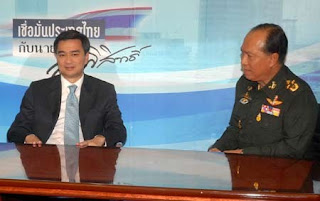
Looking for a peaceful end
By BUSINESS DESK
THE NATION
Published on April 24, 2010
The government must enforce the law immediately and restore peace to Bangkok after Thursday night's bombings, businessmen and economists said yesterday.
Ads by Google
Thailand Expat Forum
Join the Thailand Forum to talk with other experienced expats.
expatforum.com
Int'l School Bangkok
Pre K - High School. Open For All. Admission Period Opened Now!
www.BerkeleyBangkok.com
Amari Vogue Krabi Offers
Beach-front location, Spacious room Rates fr:$252 net/night. Book Now!
www.Amari.com/krabi_Tub_Kaek_BeachStill, they insisted enforcement should not result in any bloodshed, which would only worsen Thailand's image.
Even though the situation appears to be out of hand, with at least one death and more than 80 injured by the grenade blasts, some also urged another round of negotiations between the government and the anti-government protesters.
Nandor von der Luehe, chairman of the Joint Foreign Chambers of Commerce in Thailand (JFCCT), admitted the blasts on Silom Road, a major Bangkok business area, severely hurt the country's image and said the government must ensure this did not reoccur. While new investors will avoid Thailand, existing ones stay but with reduced confidence.
He called for immediate action to restore peace but said the government must ensure it was non-violent.
On Monday, the JFCCT will meet with the Board of Trade regarding the political impasse.
Phairush Burapachaisri, secretary-general of both the Board of Trade and the Thai Chamber of Commerce, said the blasts had tarnished private-sector confidence.
"The government must show strong leadership in solving the situation as soon as possible, because it appears the state apparatus is now stuck in neutral. We [Thais] feel our rights have been stolen from us. The government should not allow anyone to weaken people's rights by using their own rules," he said.
But Phairush said a House dissolution would not end the conflict, so both sides should resort to the parliamentary process.
Tore Johnsen, chief executive officer of Total Access Communication, said political stability would improve confidence in Thailand and the business environment, which would be good for everyone.
Paiboon Ponsuwanna, chairman of the Thai National Shippers' Council, said the effects of the political turmoil were no longer limited only to the tourism and service sectors, but rather had spilled over to exported-related industries.
Export trade fairs, especially dealing with food, have been postponed, because potential foreign partners and investors do not want to visit Thailand during this time, he said. Now business is conducted through e-mails or phone calls.
Feeling that rights are being violated, Paiboon also urged enforcement of the law. However, he also insisted it should not lead to loss of life or property, because that would convince foreign communities that Thailand was a barbaric country.
Federation of Thai Industries vice chairman Tanit Sorat in his column in Krungthep Turakij also insisted the conflict must be solved via parliamentary means, and both sides must not resort to violence. If the government can forge proper strategies to handle prolonged protests, there should be light at the end of the tunnel.
He wrote that if the political conflict extended to late this year, the damage could amount to between Bt170 billion and Bt200 billion, which would reduce the gross domestic product by 1.8 percentage points to only 2.7 per cent this year.
Paiboon Wattanasiritham, former chairman of Community Organisation Development and a veteran social activist, firmly believes negotiations are always possible.
"Historically, talks are the only way to end conflict," he said.
He said he agreed with the Human Rights Commission trying to organise talks between former prime ministers. Paiboon is optimistic that if five or even three former PMs met first, then it could lead to a new round of meetings between leaders of anti-government protesters and the government.
He urged them to hold private talks to find an agreeable solution, while civic groups should also try to find a peaceful solution.
Chulalongkorn University economist Narong Phetprasert said talks between the government and anti-government protesters could happen if the government could implement strategies that put protesters at a disadvantage. "Protesters will not agree to talk if they think that they are going to win the political struggle", said Narong.
However, Pairoj Vongvipanond, an economist at Dhurakij Pundit University, said there was little chance for the two sides to hold talks to end political conflicts peacefully. He said, however, that the government might choose to disperse the street demonstrators at Rajprasong intersection, Bangkok's business district. Pairoj did not think that protesters had an advantage over the government. He said that Thai society was not ripe for revolution, or an uprising against the state, due to lack of critical conditions, such as widespread social injustice or serious state suppression.
"Dispersing the demonstrations and arresting the protest leaders are expected to take place within a few weeks or no more than months while the government gathers more information about violent incidents carried out by some groups of people", he added.
Many businessmen called for the dissolution of the House before the damage spreads.
For Krirkkla Sonthimas, president of the Thai Federation on Logistics, the government now has only one option - House dissolution - to stop the damage. The government should offer a clear timeframe on dissolution.
"The incident has sent grave risks to businesses. Consumers are now in a waiting mode. All sides cling to their own reasons. The House must be dissolved by the end of 2010 to end the problem" said Somkiat Ungaree, president of The Association of the Thai Software Industry.
The views were split, though after the April 10 clash, which killed 25 persons, most of the businessmen proposed negotiations to end the conflicts.













